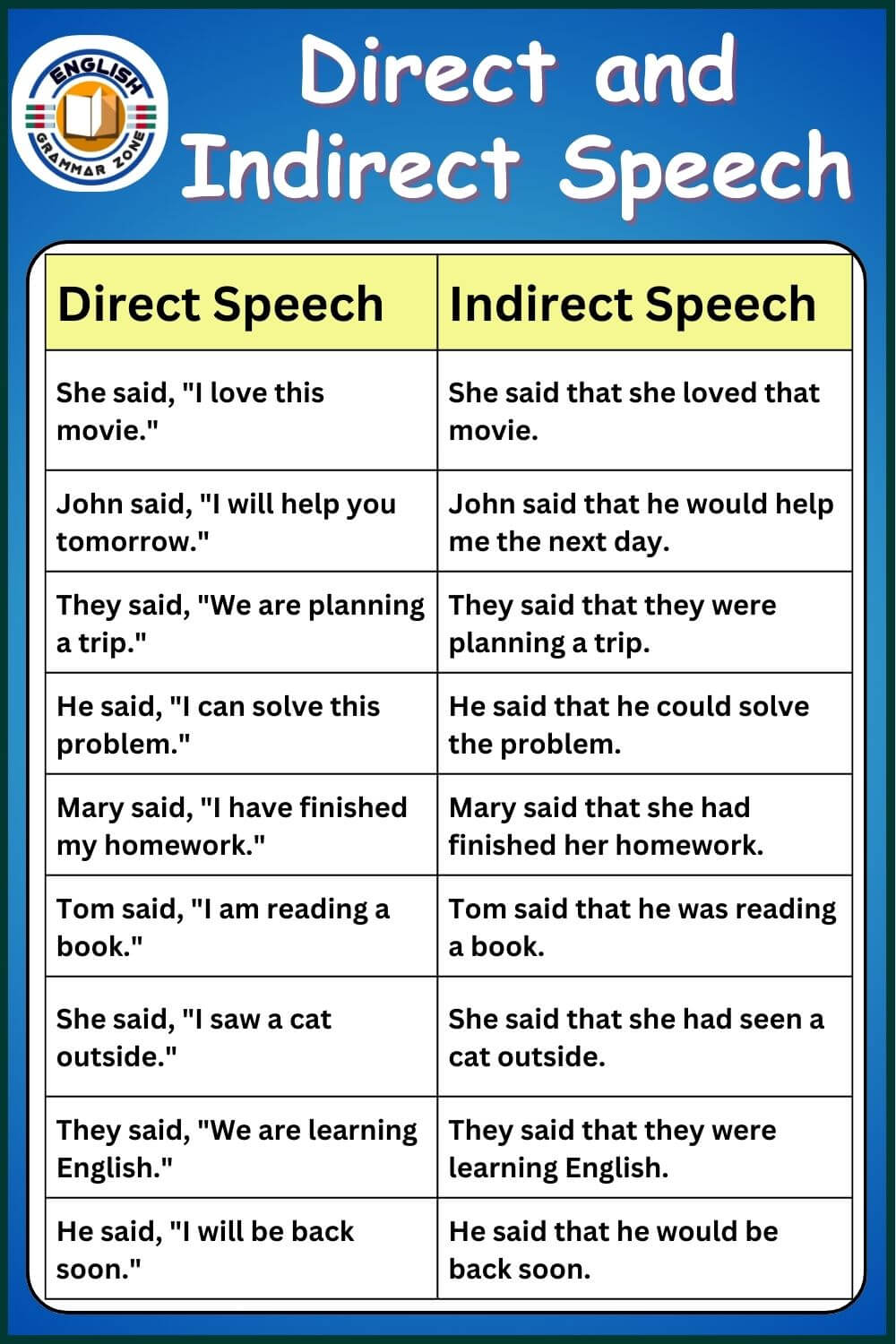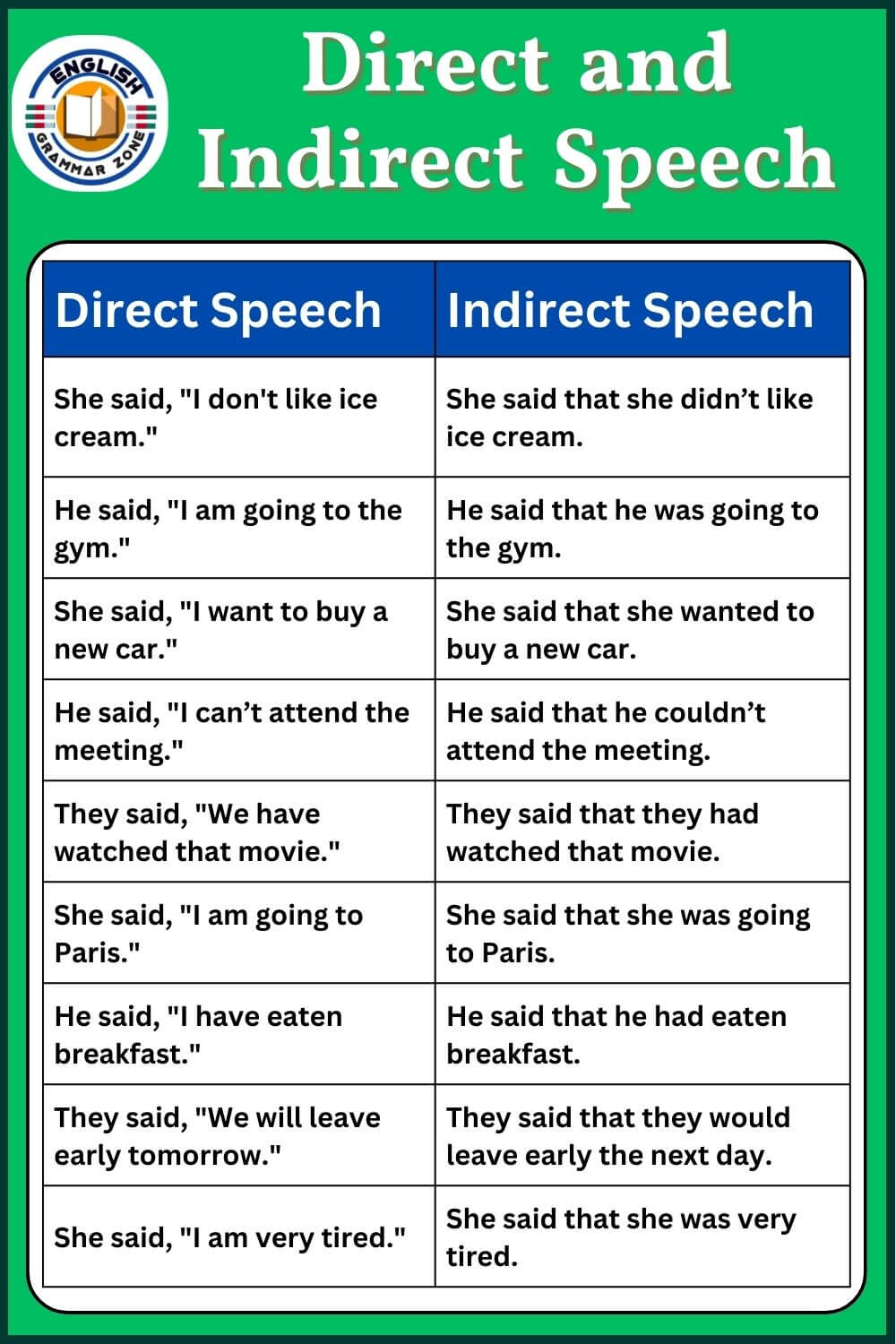What is Direct and Indirect Speech?
In English, direct speech refers to the exact words spoken by someone, usually enclosed in quotation marks (“”). Indirect speech (also known as reported speech) involves conveying what someone said without using their exact words, often making changes to pronouns, verb tenses, and other words to fit the context.
Example:
- Direct Speech: He said, “I am going to the market.”
- Indirect Speech: He said that he was going to the market.
Direct and Indirect Speech Examples in a Chart
| Direct Speech | Indirect Speech |
| She said, “I love this movie.” | She said that she loved that movie. |
| John said, “I will help you tomorrow.” | John said that he would help me the next day. |
| They said, “We are planning a trip.” | They said that they were planning a trip. |
| He said, “I can solve this problem.” | He said that he could solve the problem. |
| Mary said, “I have finished my homework.” | Mary said that she had finished her homework. |
| Tom said, “I am reading a book.” | Tom said that he was reading a book. |
| She said, “I saw a cat outside.” | She said that she had seen a cat outside. |
| They said, “We are learning English.” | They said that they were learning English. |
| He said, “I will be back soon.” | He said that he would be back soon. |
| She said, “I don’t like ice cream.” | She said that she didn’t like ice cream. |
| He said, “I am going to the gym.” | He said that he was going to the gym. |
| She said, “I want to buy a new car.” | She said that she wanted to buy a new car. |
| He said, “I can’t attend the meeting.” | He said that he couldn’t attend the meeting. |
| They said, “We have watched that movie.” | They said that they had watched that movie. |
| She said, “I am going to Paris.” | She said that she was going to Paris. |
| He said, “I have eaten breakfast.” | He said that he had eaten breakfast. |
| They said, “We will leave early tomorrow.” | They said that they would leave early the next day. |
| She said, “I am very tired.” | She said that she was very tired. |
| He said, “I visited my grandparents.” | He said that he had visited his grandparents. |
| She said, “I can help you with this.” | She said that she could help me with that. |
| He said, “I need to study more.” | He said that he needed to study more. |
| They said, “We are playing football.” | They said that they were playing football. |
| She said, “I have been to London.” | She said that she had been to London. |
| He said, “I will call you later.” | He said that he would call me later. |
| She said, “I don’t know the answer.” | She said that she didn’t know the answer. |
| They said, “We are going to the concert.” | They said that they were going to the concert. |
| He said, “I saw you at the park.” | He said that he had seen me at the park. |
| She said, “I am cooking dinner.” | She said that she was cooking dinner. |
| They said, “We have completed the task.” | They said that they had completed the task. |
| He said, “I will visit you next week.” | He said that he would visit me the next week. |
Direct and Indirect Speech
Direct and indirect speech
| Direct Speech | Indirect Speech |
| She said, “I am feeling sick.” | She said that she was feeling sick. |
| He said, “I bought a new phone.” | He said that he had bought a new phone. |
| They said, “We are enjoying the party.” | They said that they were enjoying the party. |
| She said, “I will arrive at 5 PM.” | She said that she would arrive at 5 PM. |
| He said, “I haven’t seen that movie yet.” | He said that he hadn’t seen that movie yet. |
| They said, “We are moving to a new house.” | They said that they were moving to a new house. |
| She said, “I can’t find my keys.” | She said that she couldn’t find her keys. |
| He said, “I will be traveling next month.” | He said that he would be traveling the following month. |
| They said,”We met him at the airport.” | They said that they had met him at the airport. |
| She said, “I have been waiting for an hour.” | She said that she had been waiting for an hour. |
| He said, “I am going to quit my job.” | He said that he was going to quit his job. |
| They said, “We are visiting our parents.” | They said that they were visiting their parents. |
| She said, “I cleaned the house yesterday.” | She said that she had cleaned the house the day before. |
| He said, “I didn’t like the food.” | He said that he hadn’t liked the food. |
| They said, “We have lost our passports.” | They said that they had lost their passports. |
| She said, “I am leaving for work now.” | She said that she was leaving for work then. |
| He said, “I will buy a new laptop.” | He said that he would buy a new laptop. |
| They said, “We are going to the beach.” | They said that they were going to the beach. |
| She said, “I can’t come to the meeting.” | She said that she couldn’t come to the meeting. |
| He said, “I saw her at the mall.” | He said that he had seen her at the mall. |
| They said, “We will be staying at a hotel.” | They said that they would be staying at a hotel. |
| She said, “I am reading a new book.” | She said that she was reading a new book. |
| He said, “I have never been to Paris.” | He said that he had never been to Paris. |
| They said, “We finished the project last week.” | They said that they had finished the project the previous week. |
| She said, “I will bring the documents tomorrow.” | She said that she would bring the documents the next day. |
| He said, “I forgot my wallet at home.” | He said that he had forgotten his wallet at home. |
| They said, “We are having dinner at 7 PM.” | They said that they were having dinner at 7 PM. |
| She said, “I can swim very well.” | She said that she could swim very well. |
| He said, “I have completed my assignment.” | He said that he had completed his assignment. |
| They said, “We are going to watch a movie.” | They said that they were going to watch a movie. |



